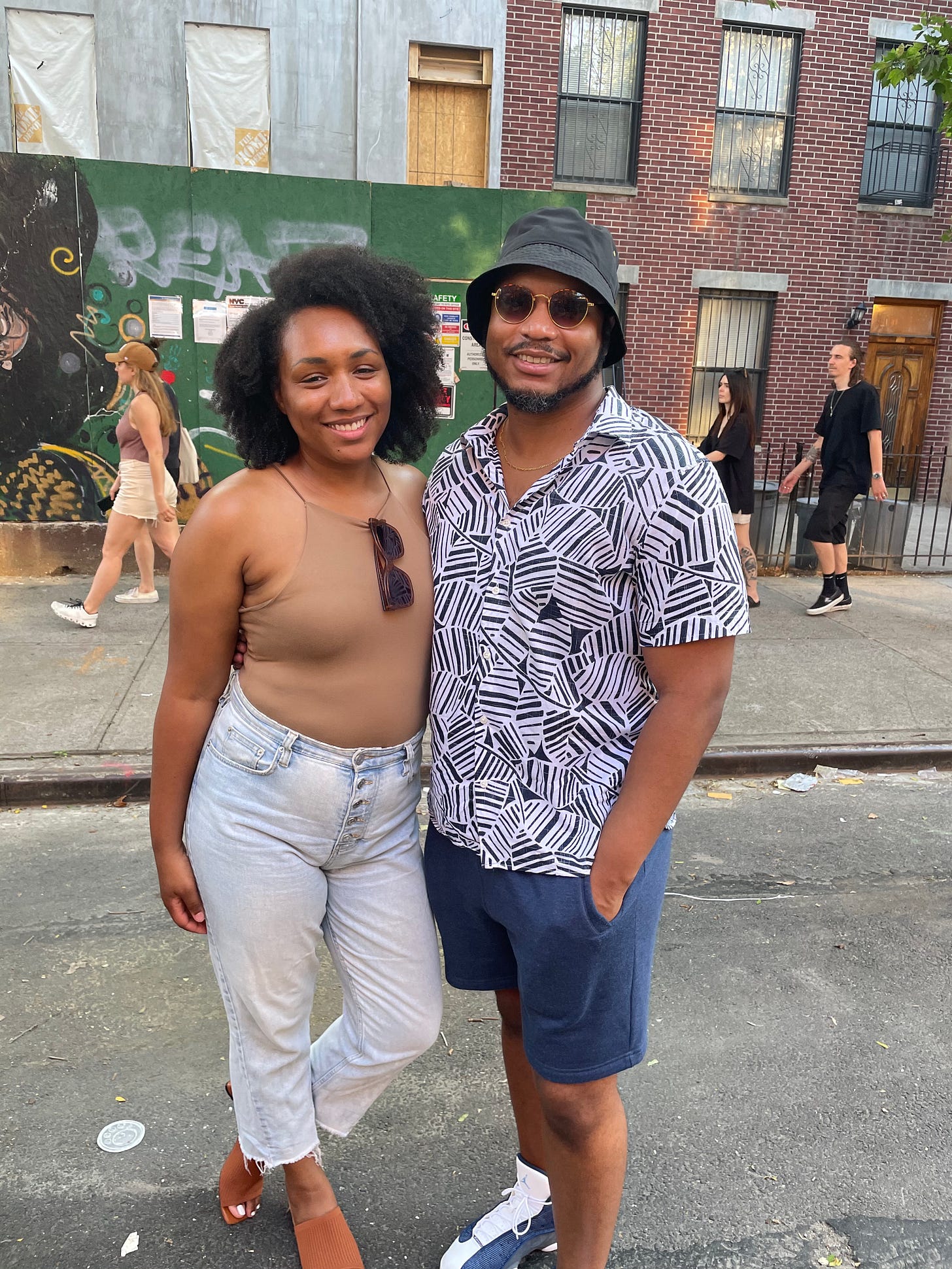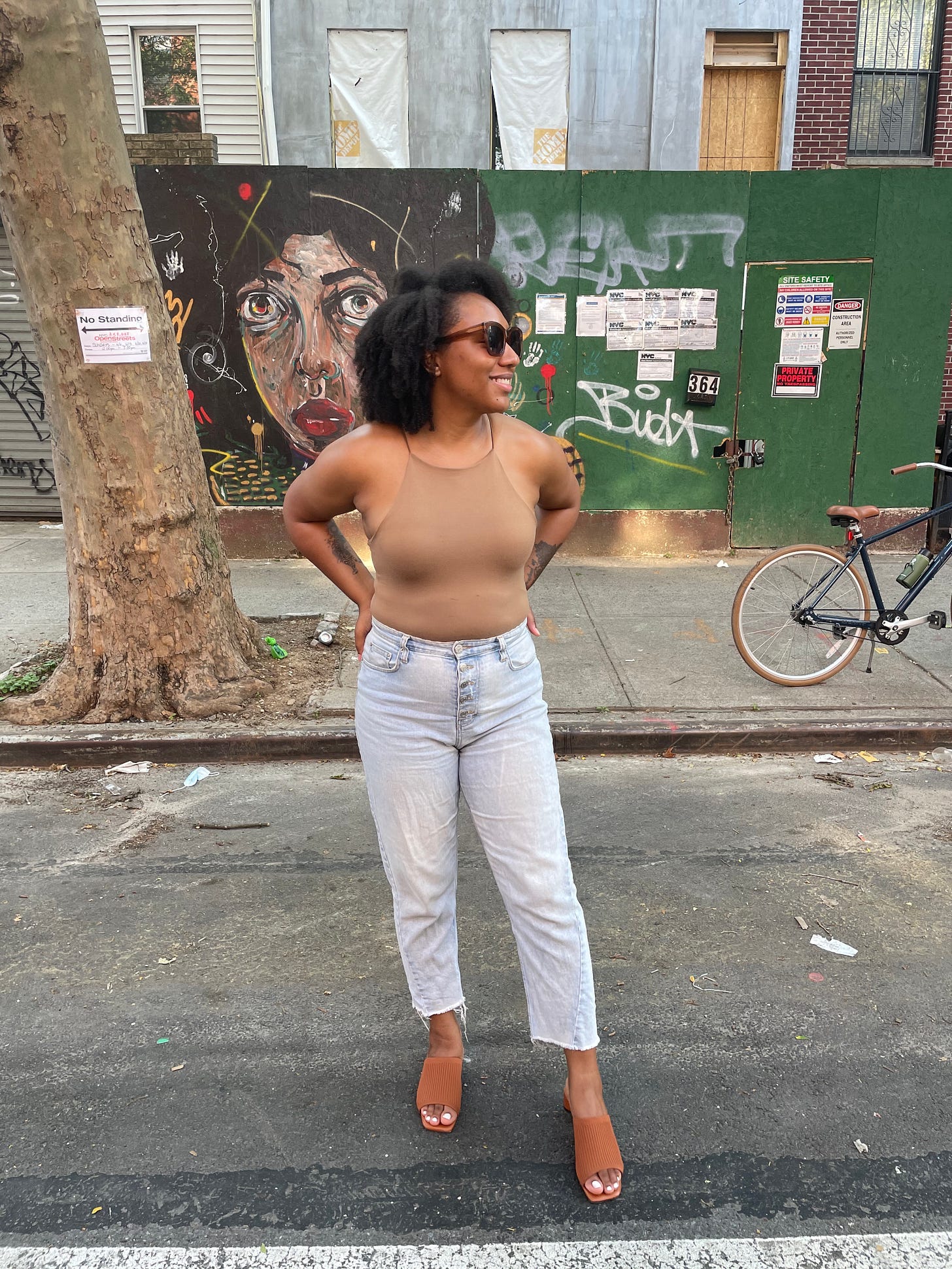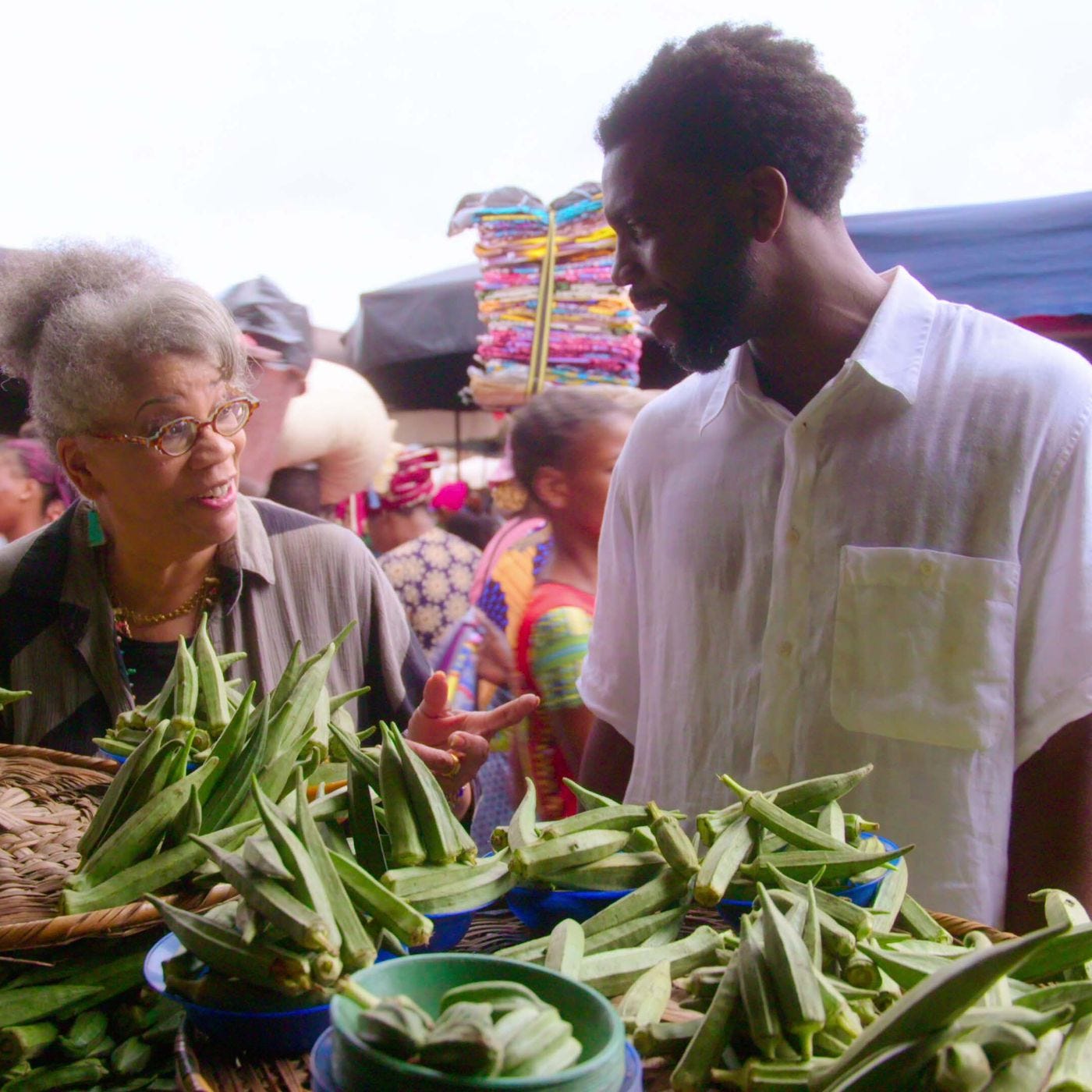If the change isn't transformative, I don't want it.
Reflecting on gate-keeping our safe spaces, Black joy in the summertime, the cultural legacy of Black food + an alté playlist for your next cookout.
June reminds me of transitions, the beginning of a new, brighter season. It is a time for socializing, re-energizing, and new experiences. On this beautiful June afternoon, I'm enjoying a day off at the agency I'm currently freelancing at in observance of Juneteenth, which is a first for me, as it is for many others. While I find it annoying that there are people who benefit from the oppression of Black folks that are now getting a paid day off to "raise awareness" and celebrate "freedom," I will take this day off because I am tired AF. I have no desire to regurgitate the many social media talking points surrounding this, instead, I want to reflect on what this holiday and time of year mean to me.
What Juneteenth reminds me of most is not slavery or delayed emancipation but community and specifically Black community. As most of you know, I was born and raised right outside of Minneapolis, Minnesota. Unlike its midwestern counterparts Detroit, Chicago, and St. Louis, it was not until very recently that people began to regard Minneapolis (and its twin city St. Paul), as a place inhabited by a significant Black population. Which in my opinion is largely due to the killing of George Floyd (and not the existence of Prince for some reason). I never had the experience of growing up in a Black neighborhood like Bronzeville, Harlem, or Bed Stuy pre-gentrification. As a result, one of my favorite films growing up (and perhaps an early catalyst for my eventual move to New York) was Crooklyn. I wanted to have a home the same color as my skin with a stoop to sit on and play games with friends who looked like me.

I wanted to live within walking distance of a bodega where I could steal a bag of potato chips and get let off easily because the owner knew I was just some knuckle-headed kid and not a cold-hearted criminal. I longed for a gang of friends who would defend me when some mean girl picked on me instead of kids who pretended to be my friend only to tease me, call me racial slurs, or spit in my hair. For me, Crooklyn was aspirational. It represented a place so drastically different than what I knew. While I longed for the experience of a Black neighborhood, I was fortunate to find a sense of belonging in spaces that seemed hidden, and in retrospect, protected from people outside of the community.
The Twin Cities area was not always a place sparse with Black enclaves. My family had roots in Rondo in St. Paul— a thriving Black community wiped out in the mid-50s to build a highway. This story is not at all uncommon for Black Americans as the 1956 Federal Highway Act displaced Black communities all over the country. Though the neighborhood's existence predates me, the legacy lived on through Rondo Days— an annual festival commemorating the area and the Black community in St. Paul as a whole. Hosted on the 3rd Saturday in July, Rondo Days was one of three significant summer events I attended as a child, the other two being the 4th of July Family BBQs and the Juneteenth festival in Minneapolis. Each event was set against the backdrop of carefree, unbridled, and unfiltered Blackness. Soul/R&B music, drill competitions, purposefully burnt hot dogs and bratwursts, potato salad, my uncle's famous ribs sizzling in a barrel pit (and sometimes being sold at Rondo Days), aunties drinking wine coolers, running through sprinklers (and getting yelled at for getting my hair wet), sucking on freezer pops, slurping black cherry Shasta, and trading secrets in some corner with my favorite cousins. That was the scene, and the energy was always consistent in its familiarity and warmth. These events created a space where I could just be. There was no mask to be worn, no code-switching, no tone policing, and nobody was offended by Black joy or our mere existence.
As the years passed, the celebrations changed. My interest in them waned as I transitioned into adolescence and unfortunately, some of those once-safe spaces became associated with gun violence and over-policing. Even the BBQs shifted as core family members passed away, and getting people together became an increasingly difficult task. There has always been a transient nature to spaces created for Black joy, leaving many of us to wonder just how long can they be left untainted? As I grew into my adult years, I knew that my only chance at recapturing that essence of community would be to leave my hometown and cultivate it elsewhere.
A couple of weeks ago, I went to a block party in Bed Stuy with some friends because I was deeply missing this feeling. We ate, we drank, we smoked, we laughed, a DJ played some fire afro-beats tunes. I had a great time, but the neighborhood was nothing like what I had seen in the movies growing up. Modern-day Bed Stuy is a mishmash of legacy residents, Black millennial transplants, and white gentrifiers. Of course, I am not from Bed Stuy, but to know how the image I held (and that Spike Lee created) of Bed Stuy has morphed into a Black community struggling to gate-keep the energy that has made it so rich and distinct is heartbreaking. Once again, this is not uncommon in nearly every aspect of Black American life. Social media has made it nearly impossible for Black folks to gate-keep in general, the language, colloquialisms, dances, mannerisms, beauty standards, fashion, and hairstyles specific to us. Black American folks are still very much in bondage when it comes to the constant appropriation of our culture, so celebrating our "freedom" while continuing to take from us at every turn feels violative.
Sidebar here are some photos from that Bed Stuy block party I went to. A photo essay I’d like to call Gentrification: Story in 4 Parts
This brings me back to how I feel about the commodification of Juneteenth. What was once a holiday for just us is now an empty symbol that acknowledges Black people without fulfilling our dire needs. It is the government telling us they will celebrate on our behalf without offering recompense or protection. Non-Black people learning about Juneteenth does little to advance our causes. It does not help folks understand the experience of having every ounce of our cultural identity stripped, stolen, and appropriated or the magnitude of ingenuity required to rebuild and recreate when this is committed over and over again. It does not make people realize this kind of infiltration renders what we'd like to keep for ourselves, encroached upon and diluted to the point of being unrecognizable. I do not want to discredit the efforts of the Black activists who have organized to make this federal holiday a reality, but I do have to question what kind of change people hope this will bring. When you consider how old this history is and how we are still being impacted by it through generational trauma, and systemic structures/institutions that began on plantations and are still in place even after being granted “freedom”, I’d surmise that this holiday will not bring forth any change that is truly transformative.
Last year, a Black man named George Floyd was killed in my hometown, a city so racially suppressed that many folks didn't even know Black people were there. His murder led to Juneteenth protests which led to demands for a defunded and eventually abolished police department. A year later, those demands have still been unmet, and gun violence remains rampant in the city. There are so few places for us to be safe. Some believe this newly enacted holiday is a step toward progress, but to me, it all feels like a reinforcement of doing less than the bare minimum. In many ways, this holiday has enabled the folks trying to clear their conscience through performative anti-racism to continually miss the mark when it comes to having the basic courtesy of just leaving us the hell alone.
but uh.. Happy Juneteenth or whatever.
What I’m Watching
High on The Hog (Netflix)
A culinary adventure that traces Black American cuisine from the motherland through the American South, the White House, and the East Coast, I absolutely loved watching this. Aside from it making me extremely hungry, it is always affirming to see how Black Americans have been able to not only create a new culture but retain parts of our West African roots. I learned so much about the Black American culinary tradition outside of just soul food. A great watch for anyone who loves food but especially for those of us who yearn for a deeper connection to our history
What I’m Reading
I haven’t had time to dive into my books because work has been running me ragged BUT.. speaking of food, you should really read Kelis' Harper’s Bazaar interview. I have been a Kelis fan since the beginning, and I’m always inspired by the way she plays by her own rules. As someone who regularly fantasizes about moving somewhere off the grid, I've thoroughly enjoyed watching her farm update videos on Instagram (I hope you got rid of those gophers for good, sis!). This quote from this interview struck me:
Earlier this year, I found out most of my ancestors were farmers, thanks to census records on Ancestry.com so perhaps my fascination with farming and living off the land is just in my DNA.
What I’m Listening To
Alté has been one of my favorite genres and movements of the past few years. My favorite artists in this lane are Amaarae, Odunsi, Cruel Santino, and Juls. I love how it fuses West African genres with Afro-Caribbean and Black American genres; it's Black unity in musical form and a whole viiiiibe.
Who I’m Supporting
The Okra Project is a mutual aid collective that provides meals and resources to Black Trans folks. You can donate here.
I chose this organization not only for the cause but for the name. Admittedly, I was not the hugest fan of okra growing up but I love what it represents. As discussed in High on The Hog okra is an African staple that made its way across the Atlantic with enslaved Africans. It represents history, cultural legacy, nourishment, and communion, just like this cause.
Enjoy your Juneteenth (and if you’re not Black, don’t show up to the function!)
Drop your suggestions for music to listen to, things to watch, books to read, causes to support, or anything you’d like me to talk about in the next one.
Catch me on these digital streets.
Watch My Short Film “One Of The Guys” 🎥
Instagram 🤳🏾
TikTok ⏰
Website 👩🏾💻
Merch 🛍️
💋 ✌🏾
With love,
LaChelle










